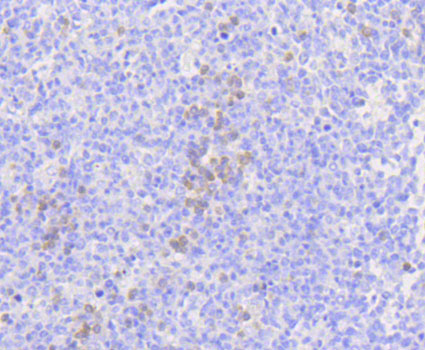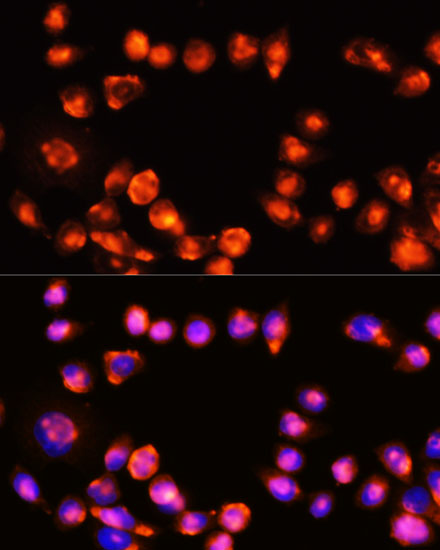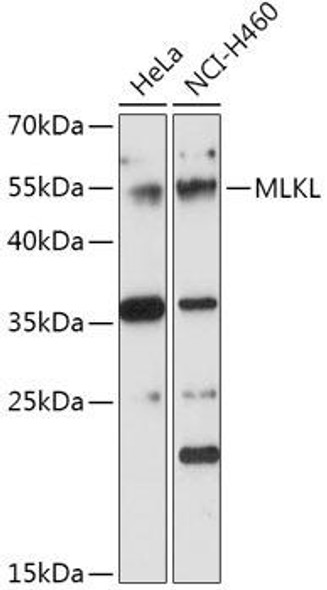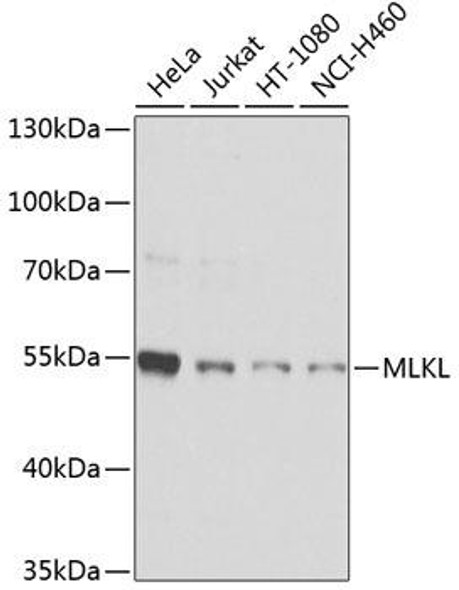Anti-MLKL Antibody (CAB11458)
- SKU:
- CAB11458
- Product type:
- Antibody
- Reactivity:
- Human
- Host Species:
- Rabbit
- Isotype:
- IgG
- Antibody Type:
- Polyclonal Antibody
- Research Area:
- Cell Death
Frequently bought together:
Description
| Antibody Name: | Anti-MLKL Antibody |
| Antibody SKU: | CAB11458 |
| Antibody Size: | 20uL, 50uL, 100uL |
| Application: | IHC IF |
| Reactivity: | Human |
| Host Species: | Rabbit |
| Immunogen: | Recombinant protein of human MLKL |
| Application: | IHC IF |
| Recommended Dilution: | IHC 1:50 - 1:200 IF 1:50 - 1:200 |
| Reactivity: | Human |
| Positive Samples: |
| Immunogen: | Recombinant protein of human MLKL |
| Purification Method: | Affinity purification |
| Storage Buffer: | Store at -20°C. Avoid freeze / thaw cycles. Buffer: PBS with 0.02% sodium azide, 50% glycerol, pH7.3. |
| Isotype: | IgG |
| Sequence: | Email for sequence |
| Gene ID: | 197259 |
| Uniprot: | Q8NB16 |
| Cellular Location: | Cell membrane, Cytoplasm |
| Calculated MW: | 30kDa/54kDa |
| Observed MW: | Refer to figures |
| Synonyms: | hMLKL, MLKL |
| Background: | This gene belongs to the protein kinase superfamily. The encoded protein contains a protein kinase-like domain; however, is thought to be inactive because it lacks several residues required for activity. This protein plays a critical role in tumor necrosis factor (TNF)-induced necroptosis, a programmed cell death process, via interaction with receptor-interacting protein 3 (RIP3), which is a key signaling molecule in necroptosis pathway. Inhibitor studies and knockdown of this gene inhibited TNF-induced necrosis. High levels of this protein and RIP3 are associated with inflammatory bowel disease in children. Alternatively spliced transcript variants have been described for this gene. |
| UniProt Protein Function: | MLKL: Belongs to the protein kinase superfamily. 2 isoforms of the human protein are produced by alternative splicing. |
| UniProt Protein Details: | Protein type:Kinase, protein; Protein kinase, Ser/Thr (non-receptor); Protein kinase, TKL; TKL group; TKL-Unique family Chromosomal Location of Human Ortholog: 16q23.1 Cellular Component: cytoplasm; cytosol; plasma membrane Molecular Function:ATP binding; protein binding; protein complex binding; protein kinase activity; signal transducer activity Biological Process: protein amino acid phosphorylation |
| NCBI Summary: | This gene belongs to the protein kinase superfamily. The encoded protein contains a protein kinase-like domain; however, is thought to be inactive because it lacks several residues required for activity. This protein plays a critical role in tumor necrosis factor (TNF)-induced necroptosis, a programmed cell death process, via interaction with receptor-interacting protein 3 (RIP3), which is a key signaling molecule in necroptosis pathway. Inhibitor studies and knockdown of this gene inhibited TNF-induced necrosis. High levels of this protein and RIP3 are associated with inflammatory bowel disease in children. Alternatively spliced transcript variants have been described for this gene. [provided by RefSeq, Sep 2015] |
| UniProt Code: | Q8NB16 |
| NCBI GenInfo Identifier: | 74762545 |
| NCBI Gene ID: | 197259 |
| NCBI Accession: | Q8NB16.1 |
| UniProt Secondary Accession: | Q8NB16,Q8N6V0, A6NCE4, |
| UniProt Related Accession: | Q8NB16 |
| Molecular Weight: | 54kDa |
| NCBI Full Name: | Mixed lineage kinase domain-like protein |
| NCBI Synonym Full Names: | mixed lineage kinase domain like pseudokinase |
| NCBI Official Symbol: | MLKL |
| NCBI Official Synonym Symbols: | hMLKL |
| NCBI Protein Information: | mixed lineage kinase domain-like protein |
| UniProt Protein Name: | Mixed lineage kinase domain-like protein |
| UniProt Gene Name: | MLKL |








